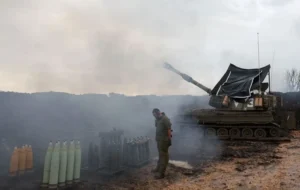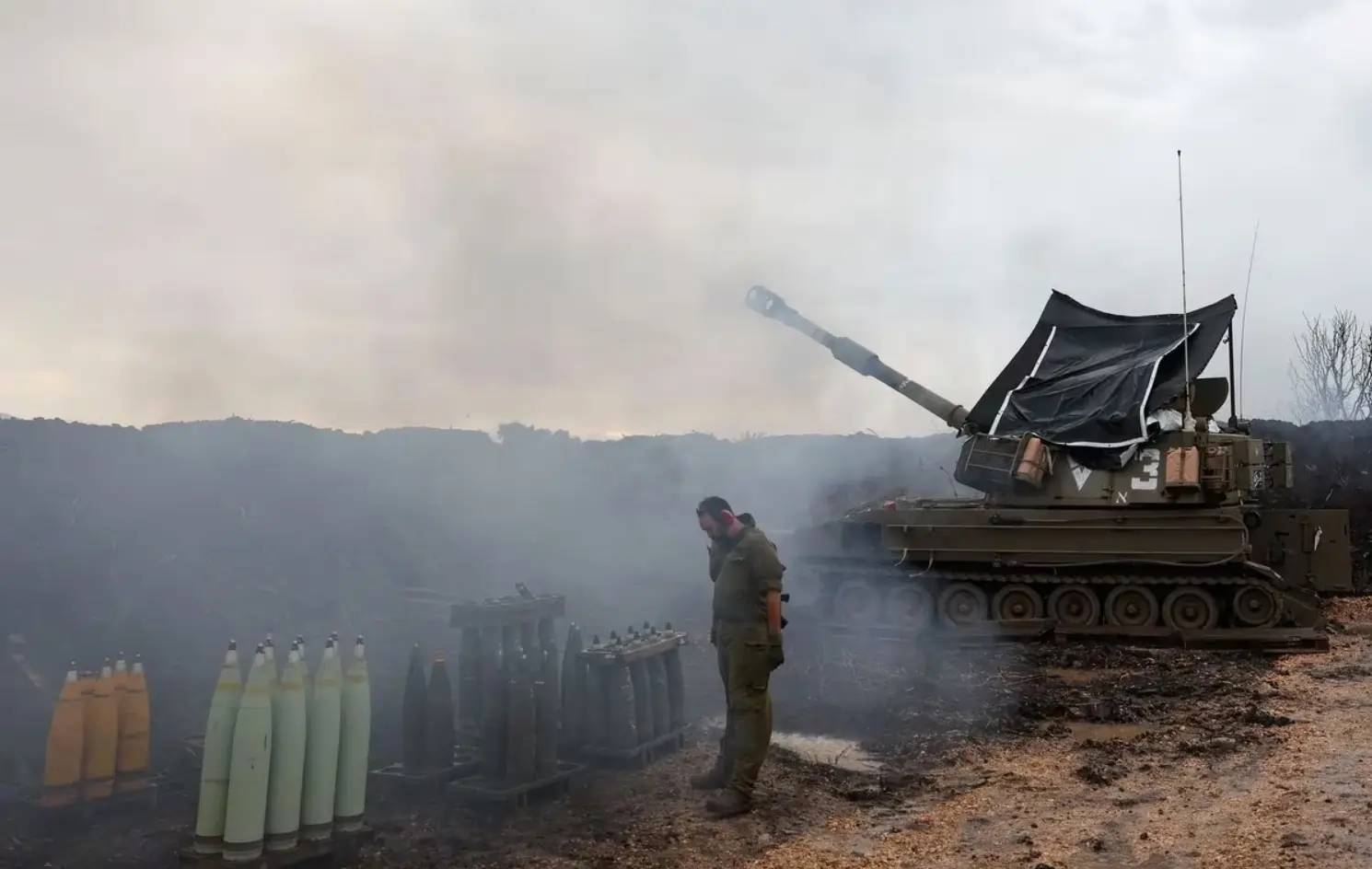
Summary:
– French Foreign Minister delivers proposal, according to Lebanese officials.
– Proposal involves Hezbollah fighters withdrawing and conducting border negotiations.
– Lebanese officials express objections to certain elements, leading to further discussions.
– Proposed steps include the deployment of the Lebanese army with support for its operations.
France has submitted a written proposal to Beirut with the goal of ceasing hostilities with Israel and resolving the contentious Lebanon-Israel border issue. The document, viewed by Reuters, specifies that fighters, including Hezbollah’s elite unit, should withdraw 10 kilometers (6 miles) from the border.
The objective of the plan is to halt the clashes between the Iran-backed Hezbollah and Israel along the border. These ongoing hostilities, which coincide with the conflict in Gaza, are heightening fears of a catastrophic, full-scale confrontation.
The document, marking the initial written proposal presented to Beirut after weeks of Western mediation efforts, was handed over to key Lebanese government figures, including Prime Minister Najib Mikati, by French Foreign Minister Stephane Sejourne last week. This information was shared by four senior Lebanese officials and three French officials.
The document underscores the objective of averting a conflict “that could escalate beyond control” and enforcing “a possible ceasefire when the circumstances allow.” Ultimately, it envisions initiating negotiations to delineate the disputed land border between Lebanon and Israel.
Hezbollah refuses to engage in formal negotiations for de-escalation until the conflict in Gaza comes to a conclusion. This stance was reaffirmed by a Hezbollah representative when asked about it for this report.
Although there have been discussions about similar mediation efforts by U.S. Middle East envoy Amos Hochstein in recent weeks, the comprehensive details of the French written proposal sent to Lebanon have not been previously disclosed.
The proposed plan consists of three steps, envisioning a 10-day process of de-escalation culminating in border negotiations.
According to a French diplomatic source, the proposal has been presented to the governments of Israel, Lebanon, and Hezbollah.
France maintains historical ties with Lebanon, where it has significant involvement. The country hosts approximately 20,000 French citizens and deploys around 800 troops as part of a United Nations peacekeeping force.
“We have put forward proposals. We are coordinating with the Americans, and it’s crucial that we consolidate all initiatives and work towards establishing peace,” stated Sejourne during a news conference on Monday.
The plan suggests that Lebanese armed groups and Israel would halt military operations against each other, which includes Israeli airstrikes in Lebanon.
During the recent hostilities, various non-state groups, including Palestinian factions, have conducted attacks on Israel from southern Lebanon. However, Hezbollah holds the dominant position in the region, with its fighting force widely considered to be more powerful than the Lebanese army.
As per the proposal, Lebanese armed groups would dismantle all facilities and structures near the border and withdraw combat forces, including Hezbollah’s elite Radwan fighters and military assets such as antitank systems, at least 10 kilometers north of the border.
However, even with such a withdrawal, Hezbollah fighters could remain significantly closer to the border than the 30 kilometers stipulated in a U.N. resolution that ended a war with Israel in 2006, reaching only as far as Lebanon’s Litani River.
This shorter withdrawal distance aims to prevent rockets from reaching villages in northern Israel, which have been targeted with anti-tank missiles. It represents a compromise that is considered more acceptable to Hezbollah than a retreat to the Litani, as explained by a Western diplomat familiar with the two-page proposal.
The proposal also entails the deployment of up to 15,000 Lebanese army troops in the border region of southern Lebanon, an area politically aligned with Hezbollah, where the group’s fighters have historically integrated into society during periods of calm.
Senior Hezbollah politician Hassan Fadlallah told Reuters that the group would not engage in discussions regarding “any matter related to the situation in the south” until the aggression on Gaza ceases.
Fadlallah emphasized that the enemy is not in a position to dictate terms, declining to comment on the specifics of the proposal or whether Hezbollah had received it.
According to one Lebanese official, the document consolidates ideas explored in discussions with Western envoys and has been transmitted to Hezbollah. The French officials informed the Lebanese government that the document is not final, acknowledging objections raised by Beirut regarding certain aspects of the proposal.
An Israeli official confirmed that such a proposal had been received and was under discussion within the government.
Last month, Reuters reported that Hezbollah had rejected ideas put forward by Hochstein, a central figure in the mediation efforts, but had also left room for diplomatic engagement.
In response to inquiries for this report, a State Department spokesperson stated that the United States “continues to explore all diplomatic options with our Israeli and Lebanese counterparts to restore calm and avoid escalation.” The White House did not provide an immediate response to a request for comment.
The Lebanese official expressed several concerns about the proposal, including the requirement for armed groups to dismantle facilities near the border. The official described this demand as vaguely worded and potentially leading to calls for action against civilian institutions affiliated with Hezbollah.
“Uncertain Aspects”
Since the conflict began on October 8th, tens of thousands of people on both sides of the border have been forced to flee their homes.
Israeli airstrikes have resulted in the deaths of nearly 200 individuals in Lebanon, including 170 Hezbollah fighters. Meanwhile, attacks from Lebanon have claimed the lives of 10 soldiers and five civilians in Israel.
Although the strikes have primarily occurred in border areas, both sides have expressed a desire to avoid full-scale war.
Several Western diplomats have visited Beirut to discuss ways to de-escalate the situation, primarily engaging with Lebanese government officials rather than Hezbollah, which is designated as a terrorist organization by the United States.
According to one Lebanese official, a French technical delegation revisited Beirut two days after Sejourne’s visit to address concerns raised by Lebanon.
Another Lebanese official stated that Beirut has not yet provided a response to the proposal, noting that it lacks signatures and dates, thus not considered official enough to warrant a formal reply.
“Three-Part Strategy”
The proposal draws on past ceasefire agreements, such as the one that ended the conflict between Hezbollah and Israel in 1996 and U.N. Security Council resolution 1701, which concluded the 2006 war. It outlines a three-step plan to be implemented over a span of 10 days.
In the first step, both sides would halt military operations. Within three days, the second step would involve Lebanese armed groups withdrawing combat forces at least 10 kilometers north of the border, while Lebanon would begin deploying soldiers in the southern region. Israel would cease its overflights into Lebanese airspace.
The third step, to be completed within 10 days, would see Lebanon and Israel resume negotiations to delineate the land border gradually, with the assistance of the U.N. peacekeeping force UNIFIL. Additionally, negotiations would take place to establish a plan ensuring the area between the border and the Litani river remains free from non-state armed groups.
Hezbollah has hinted at its potential support for the Lebanese government negotiating a deal with Israel to resolve border disputes in Lebanon’s favor.
Addressing the financing challenge facing the Lebanese army, which has been weakened by Lebanon’s severe financial crisis, the proposal calls for international support for the army’s deployment. This support would include financing, equipment, training, and socio-economic development initiatives in southern Lebanon.
